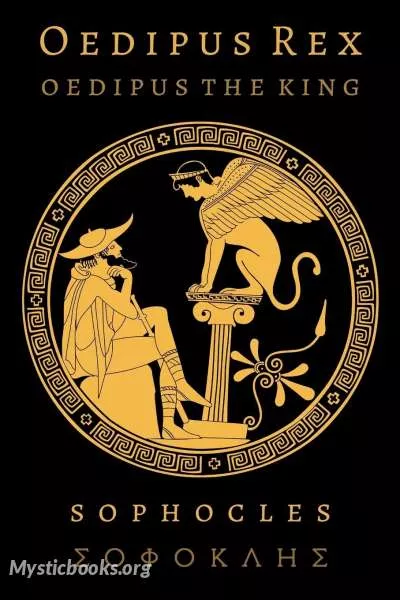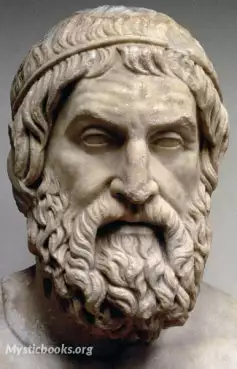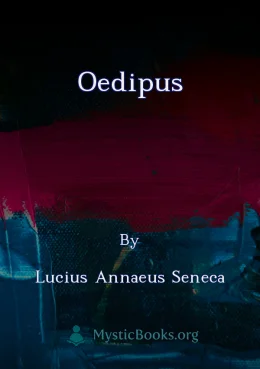
Oedipus Rex
by Sophocles
'Oedipus Rex' Summary
Oedipus, King of Thebes, sends his brother-in-law, Creon, to ask advice of the oracle at Delphi, concerning a plague ravaging Thebes. Creon returns to report that the plague is the result of religious pollution, since the murderer of their former king, Laius, has never been caught. Oedipus vows to find the murderer and curses him for causing the plague.
Oedipus summons the blind prophet Tiresias for help. When Tiresias arrives he claims to know the answers to Oedipus's questions, but refuses to speak, instead telling him to abandon his search. Oedipus is enraged by Tiresias' refusal, and accuses him of complicity in Laius' murder. Outraged, Tiresias tells the king that Oedipus himself is the murderer ("You yourself are the criminal you seek"). Oedipus cannot see how this could be, and concludes that the prophet must have been paid off by Creon in an attempt to undermine him. The two argue vehemently, as Oedipus mocks Tiresias' lack of sight, and Tiresias retorts that Oedipus himself is blind. Eventually Tiresias leaves, muttering darkly that when the murderer is discovered he shall be a native citizen of Thebes, brother and father to his own children, and son and husband to his own mother.
Creon arrives to face Oedipus's accusations. The King demands that Creon be executed; however, the chorus persuades him to let Creon live. Jocasta, wife of first Laius and then Oedipus, enters and attempts to comfort Oedipus, telling him he should take no notice of prophets. As proof, she recounts an incident in which she and Laius received an oracle which never came true. The prophecy stated that Laius would be killed by his own son; however, Jocasta reassures Oedipus by her statement that Laius was killed by bandits at a crossroads on the way to Delphi.
The mention of this crossroads causes Oedipus to pause and ask for more details. He asks Jocasta what Laius looked like and the location of where he met his demise, and Oedipus suddenly becomes worried that Tiresias's accusations were true. Oedipus then sends for the one surviving witness of the attack to be brought to the palace from the fields where he now works as a shepherd.
Jocasta, confused, asks Oedipus what the matter is, and he tells her. Many years ago, at a banquet in Corinth, a man drunkenly accused Oedipus of not being his father's son. Oedipus went to Delphi and asked the oracle about his parentage. Instead of answers he was given a prophecy that he would one day murder his father and sleep with his mother. Upon hearing this he resolved to leave Corinth and never return. While traveling he came to the very crossroads where Laius was killed, and encountered a carriage which attempted to drive him off the road. An argument ensued and Oedipus killed the travelers, including a man who matches Jocasta's description of Laius. Oedipus has hope, however, because the story is that Laius was murdered by several robbers. If the shepherd confirms that Laius was attacked by many men, then Oedipus is in the clear.
A man arrives from Corinth with the message that Oedipus's father has died. Oedipus, to the surprise of the messenger, is made ecstatic by this news, for it proves one half of the prophecy false, for now he can never kill his father. However, he still fears that he may somehow commit incest with his mother. The messenger, eager to ease Oedipus's mind, tells him not to worry, because Merope was not in fact his real mother.
It emerges that this messenger was formerly a shepherd on Mount Cithaeron, and that he was given a baby, which the childless Polybus then adopted. The baby, he says, was given to him by another shepherd from the Laius household, who had been told to get rid of the child. Oedipus asks the chorus if anyone knows who this man was, or where he might be now. They respond that he is the "same shepherd" who was witness to the murder of Laius, and whom Oedipus had already sent for. Jocasta, who has by now realized the truth, desperately begs Oedipus to stop asking questions, but he refuses and Jocasta runs into the palace.
When the shepherd arrives Oedipus questions him, but he begs to be allowed to leave without answering further. However, Oedipus presses him, finally threatening him with torture or execution. It emerges that the child he gave away was Laius's own son, and that Jocasta had given the baby to the shepherd to secretly be exposed upon the mountainside. This was done in fear of the prophecy that Jocasta said had never come true: that the child would kill his father.
Everything is at last revealed, and Oedipus curses himself and fate before leaving the stage. The chorus laments how even a great man can be felled by fate, and following this, a servant exits the palace to speak of what has happened inside. When Jocasta enters the house, she runs to the palace bedroom and hangs herself there. Shortly afterward, Oedipus enters in a fury, calling on his servants to bring him a sword so that he might cut out his mother's womb. He then rages through the house, until he comes upon Jocasta's body. Giving a cry, Oedipus takes her down and removes the long gold pins that held her dress together, before plunging them into his own eyes in despair, blinding himself.
A blind Oedipus now exits the palace and begs to be exiled as soon as possible. Creon enters, saying that Oedipus shall be taken into the house until oracles can be consulted regarding what is best to be done. Oedipus's two daughters (and half-sisters), Antigone and Ismene, are sent out and Oedipus laments their having been born to such a cursed family. He begs Creon to watch over them in hopes that they will live where there is opportunity for them and to have a better life than their father (half-brother). Creon agrees, before sending Oedipus back into the palace.
On an empty stage the chorus repeats the common Greek maxim, that no man should be considered fortunate until he is dead.
Book Details
Authors

Sophocles
Greece
Sophocles, a towering figure in ancient Greek literature, was a renowned tragedian whose plays continue to captivate audiences today. Born around 497/496 BC in Athens, he lived a long and illustrious...
Books by SophoclesDownload eBooks
Listen/Download Audiobook
- Select Speed
Related books

Missing by Mary Augusta Ward
Set against the backdrop of World War I, 'Missing' follows Nelly Sarratt, a young woman whose life is upended when her husband, Lieutenant George, is...

Groote Verwachtingen by Charles Dickens
Groote Verwachtingen, een klassiek werk van Charles Dickens, volgt het leven van Pip, een weeskind uit de lagere klassen, die plots in aanraking komt...

Criminal from Lost Honour by Friedrich Schiller
This short story explores the intricate relationship between circumstance, morality, and crime. Through the lens of Christian Wolf, an innkeeper who...

Oedipus by Lucius Annaeus Seneca
Oedipus is a Latin verse tragedy based on the Greek legend of Oedipus and his marriage to his mother Jocasta. An oracle prophesied that Oedipus would...

Don Juan by Lorenzo Da Ponte
Lorenzo da Ponte's libretto for Mozart's opera *Don Giovanni* is a captivating work that explores themes of love, betrayal, and the consequences of a...

Völsungasaga by Anonymous
The Völsunga saga is a 13th-century Icelandic prose epic that recounts the story of the legendary Völsung clan. It is a powerful and tragic tale of lo...

Suppliant Maidens (Morshead Translation) by Aeschylus
The Suppliants, by Aeschylus, is a Greek tragedy that tells the story of the Danaids, fifty daughters fleeing a forced marriage to their Egyptian cous...

Sohrab and Rustum: An Episode by Matthew Arnold
Sohrab and Rustum is a tragic poem that explores the themes of fate, identity, and the consequences of war. It tells the story of Sohrab, a young Tart...

Perjur'd Husband, or The Adventures of Venice by Susanna Centlivre
'Perjur'd Husband, or The Adventures of Venice' is a tragic play by Susanna Centlivre, exploring themes of love, betrayal, and the complexities of fa...

Ring of the Niblung by Richard Wagner
Richard Wagner's *Der Ring des Nibelungen* (The Ring of the Nibelung) is a monumental four-opera cycle that explores themes of love, power, fate, and...
Reviews for Oedipus Rex
No reviews posted or approved, yet...